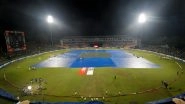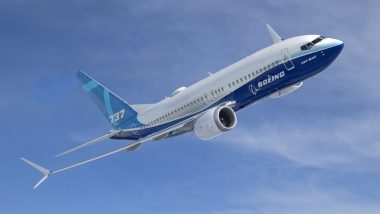Washington D.C, Jun 27: A new flaw was discovered in the specialised computer system of Boeing 737 Max planes that automates a wide variety of in-flight tasks, two sources familiar with the matter said on Wednesday, an issue that is expected to further delay the aircraft's return to service. Quoting sources, CNN reported that pilots during the simulator tests of the planes discovered a microprocessor failure that could push the nose of the plane toward the ground.
When testing the potential failure of the microprocessor in the simulators, "it was difficult for the test pilots to recover in a matter of seconds," one of the sources was quoted as saying."And if you can't recover in a matter of seconds, that's an unreasonable risk," he added. List of Countries Grounding Boeing 737 Max Grows, Now At Nine Including UK, Singapore and Australia.
The latest versions of Boeing's aircrafts were grounded in mid-March after the fatal crashes in Ethiopia and Indonesia that killed 346 people. While the crashes remain under investigation, preliminary reports showed that a new stabilisation system pushed both planes into steep nosedives from which the pilots could not recover. The issue is known in aviation vernacular as runaway stabiliser trim.
Boeing has been working to fix the automatic safety feature which is the focus of crash investigations. There is no timeframe yet for the 737 Max's return to service."The safety of our airplanes is Boeing's highest priority," the company said in a statement.
Boeing said that the Federal Aviation Administration (FAA) had "identified an additional requirement that it has asked the company to address through the software changes that the company has been developing for the past eight months."
"Boeing agrees with the FAA's decision and request, and is working on the required software," the company said, adding that "Boeing will not offer the 737 MAX for certification by the FAA until we have satisfied all requirements for certification of the MAX and its safe return to service."The sources further stressed that engineers of the American aerospace company are trying to determine if the microprocessor issue can be fixed by reprogramming software or if replacing the physical microprocessors on each 737 Max aircraft may be required.
The FAA is still actively considering whether more time consuming and expensive simulator training will be required, according to both sources. Gregory Martin, an FAA spokesman, said that the flight regulator "is following a thorough process, not a prescribed timeline, for returning the Boeing 737 Max to passenger service.
"The spokesman said, "The FAA will lift the aircraft's prohibition order when we deem it is safe to do so," adding, "We continue to evaluate Boeing's software modification and we are still developing necessary training requirements."
(The above story is verified and authored by ANI staff, ANI is South Asia's leading multimedia news agency with over 100 bureaus in India, South Asia and across the globe. ANI brings the latest news on Politics and Current Affairs in India & around the World, Sports, Health, Fitness, Entertainment, & News. The views appearing in the above post do not reflect the opinions of LatestLY)













 Quickly
Quickly


